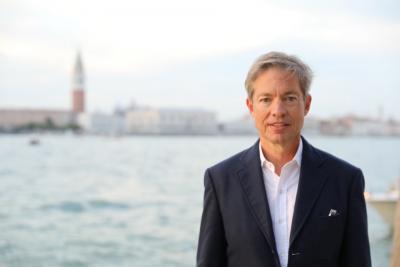Billionaire Berggruen opens Europe chapter of democracy institute in Venice
ALINA TRABATTONI
|
13 July 2023

Nicolas Berggruen in Venice. Photo: Marta Buso
By Alina Trabbatoni
VENICE - - Billionaire philanthropist Nicolas Berggruen has unveiled the European chapter of his eponymous institute in Venice. The June European chapter launch in Venice comes in the wake of similar launches in California, US and a Peking, China.
Known for his commitment to improving humanity's condition, Berggruen has allocated a significant portion of his net worth to advancing positive change globally. Berggruen’s institute aims to foster new ideas and shape political, social, and economic systems in an era of profound change, with a particular focus on areas such as governance, globalization, culture, and philosophy.
“We work on four big themes: democracy and reforms around democracy; capitalism, reforms around capitalism; relations between the West and China; and we also look at who we are becoming as humans
given the technologies that are now allowing us to change our own nature,” Berggruen said in an interview. “These are big themes that are rooted in us historically and that we will continue to work on in the West.”
Born in Paris to a wealthy German art collector, Nicholas Berggruen moved to the US to pursue his university education. Over the years, he founded investment management firm Berggruen Holdings in 1985 and co-founded Alpha Investment Management, a fund of hedge funds that he eventually sold to Safra Bank. In 2010, he established the Berggruen Institute as an innovative think-tank dedicated to developing ideas for the future of democracy and capitalism. Berggruen currently serves as chairman of the institute.
The European chapter of the Berggruen Institute is strategically located in Venice, a city that symbolizes the crossroads between East and West. Housed in a magnificent palazzo – Casa dei Tre Orci - the
activities of the European chapter mirrors those of its counterparts in China and California, bringing together scholars, thinkers, and leaders from diverse fields to engage in interdisciplinary research, dialogue, and action.
The Berggruen Institute Europe in Venice seeks to serve as a platform for intellectual and cultural dialogue. Its presence in the historical city of Venice, known as the crossroads between East and West, signifies the institute's commitment to fostering global conversations and generating new visions. By convening scholars, policymakers, artists, and thinkers, the institute aims to address the major challenges of the twenty-first century and shape a better future for society.
at
Heading the European chapter of the institute is Lorenzo Marsili, a philosopher, writer, and social entrepreneur. Marsili's background aligns perfectly with the institute's mission. As a former Berggruen Fellow and the founder of European Alternatives and Fondazione Rizoma, Marsili has actively championed a future beyond the limitations of the nation-state. His expertise and leadership position him well to guide the Berggruen Institute Europe.
“Venice is often considered little more than a museum. The same fate is often predicted for Europe as a whole - beautiful but irrelevant,” said Marsili. “The Institute believes Venice and Europe can become not
the museum but the convenor of the world, hosting a planetary conversation on the common challenges faced by a common humanity.”
Venice is a “traditional place of dialogue connecting the East and the West and the institute will build a particular connection between its centres in to animate that crucial dialogue that today still escapes our
politics,” Marsili added in an interview.
The institute's ultimate goal is to bridge the gap between academia, policymaking, and the general public, promoting intellectual exchange and collaboration to generate ideas and policies that have a positive effect on society.
Through various programs, initiatives, fellowships, and partnerships, the Berggruen Institute seeks to advance knowledge, promote good governance, and contribute to the creation of a more inclusive,
sustainable, and just global community. In an era of complex challenges, the institute aims to shape the future by examining multiple viewpoints, fostering critical thinking, and exploring innovative solutions.
The opening weekend of the European chapter was marked by a captivating marathon dialogue involving prominent figures such as philosopher Giorgio Agamben, Hans Ulrich Obrist, Carlo Rovelli,
Francesca Bria, Lea Ypi, Rana Dasgupta, and Marina Garcés. The stimulating exchange of ideas set the stage for future intellectual exploration and collaboration within the institute.
As the European chapter unfolds, it will offer a series of programs, workshops, symposia, and exhibitions at the Casa dei Tre Oci. This neo-Gothic palace, designed by artist Mario de Maria in 1913, has a rich
history of hosting artists and intellectuals. Its restoration, led by architect Silvio Fassi, will preserve its cultural heritage while transforming it into a space where global dialogue and the development of new
ideas will take place.
The institute, with its global reach and commitment to impactful ideas, endeavors to shape the progress and direction of societies worldwide. Through initiatives such as blueprinting youth employment in
Europe, fostering dialogue between Chinese leadership and the West, strengthening election processes in California, and launching Noema - a publication that features thought leaders from around the world
– it strives and successfully makes a positive impact.
Furthermore, the Berggruen Institute annually awards the prestigious Berggruen Prize, a $1 million award given by an independent jury to a thinker whose ideas shape human consciousness and advance
humanity.
As the Berggruen Institute Europa in Venice evolves, those involved pledge to remain steadfast in their mission of addressing fundamental issues, fostering global dialogue, and contributing to positive change
in societies worldwide.
“At a time of deglobalisation and political fragmentation, the Institute will convene the best minds of the continent to produce a vision for planetary renewal,” Marsili says. With the Casa dei Tre Oci as its venue for intellectual exploration and cultural exchange, the institute is poised to shape a better future through innovative ideas and collaborative efforts.
es-at
© COPYRIGHT ITALIAN INSIDER
UNAUTHORISED REPRODUCTION FORBIDDEN


